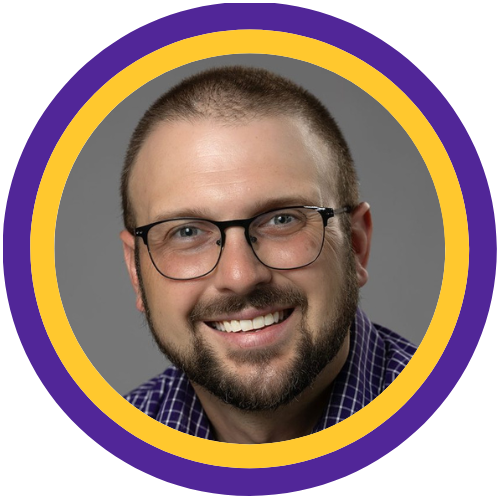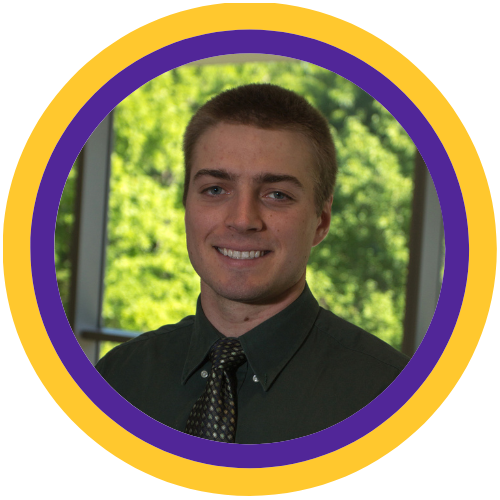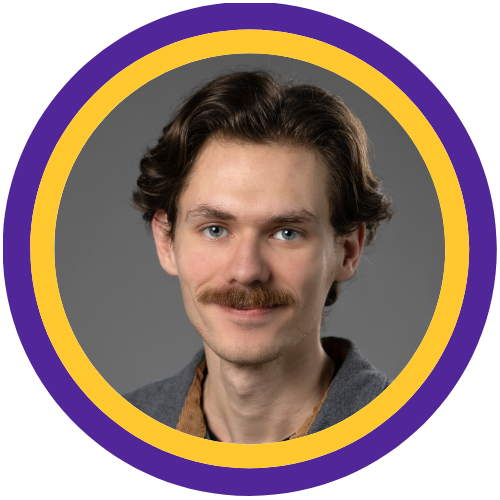Option 1: Exploring Generative AI in Undergraduate Teacher Education
In this session, Dr. Gierhart will share practices and resources from his undergraduate "Educational Technology" course at UWSP in which pre-service teaching candidates explore a generative AI (GAI) tool (e.g., ChatGPT, Microsoft Copilot, Google Gemini, MagicSchool, etc.) and consider impacts and implications on instructional designing, student learning, accessibility, academic integrity, ethics/policies, and assessment implications. Samples of published student podcasts regarding their insights and takeaways from these assignments will also be shared. The course activities and opportunities for exploration that will be presented in this session are transferable to in-service teachers and K-12 education leaders, and this will be made explicit in the session.

Aaron Gierhart, University of Wisconsin-Stevens Point (School of Education)
Aaron R. Gierhart, Ed.D. is an Assistant Professor of Educational Technology in the School of Education at the University of Wisconsin-Stevens Point. He hosts a seasonal podcast called Journeys of Teaching and worked as an elementary classroom teacher in Illinois for 11 years. His research interests include (critical) digital pedagogy, teacher education, and narratives of pedagogy.
Option 2: The Value of Open-Source: Leveraging Free, Code-First Tools to Iterate Towards Advanced Analytics
AI is often relayed as out-of-the-box "gadgets" for productivity boost. While this view can be useful, it elicits ambiguity about actions organizations should take--especially those early in their data science journey--often with large financial implications, and bypasses a foundational strategy for data-informed decision making: solid data infrastructure, a flexible tool stack, and sound analytical thinking—the building blocks of AI itself. In this presentation we discuss free, code-first tools that individuals and organizations can begin integrating as a cost-effective way to move towards advanced analytics. Specifically, we shed light on the R statistical programming language, Quarto for reproducible reporting workflows, and Shiny for custom web applications. We also cover some practical tips, tools and resources to aid in your learning journey. Finally, an example of how these tools are currently used to manage a repository of clinical risk prediction models (riskcalc.org) is provided.

Alexander Zajichek, Cleveland Clinic
Alex Zajichek is a statistician/data scientist in Central Wisconsin focused on statistical analysis, predictive modeling, and application development. Much of his career has been spent in clinical research at Cleveland Clinic, while previously serving as a data scientist at Aspirus Health and Sentry Insurance. His primary interests are in exposing the value of open-source, code-first data science tools, such as the R programming language, Python, Shiny, Quarto, and more, to empower individuals, organizations, and businesses to integrate advanced analytics tools and statistical rigor into their work.
Option 3: A Beginner's Guide to Integrating AI Tools into Your Daily Routine
You’ve likely seen the buzz about AI tools in the news and online, but it’s not always clear how they can make a real difference in your daily work. This workshop is designed specifically for AI beginners who want to take the mystery out of this transformative technology and put it to work in practical, meaningful ways. During this session, you’ll discover how AI tools can:
Streamline your workflow, saving time and effort.
Take over repetitive, mundane tasks so you can focus on more impactful work.
Offer innovative solutions to common workplace challenges.
Through hands-on demonstrations and relatable examples, you'll learn how to seamlessly integrate AI into your routine, whether you’re managing emails, organizing your workload, conducting research, or tackling other daily tasks. By the end of the workshop, you’ll feel empowered with actionable strategies and the confidence to make AI a transformative part of your workday.

Noah LaMaide, Outreach Specialist, UW-Stevens Point Continuing Education
Noah LaMaide serves as an Outreach Specialist at UW-Stevens Point Continuing Education, where he focuses on the creation and logistics of professional development programming. With a passion for innovation, Noah is a strong advocate for leveraging AI tools to streamline workflows and automate tedious processes, enhancing efficiency and productivity in professional settings.
